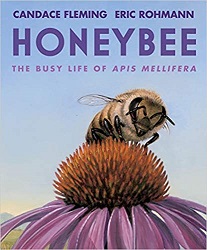
 Honeybee
HoneybeeThe Busy Life of Apis Mellifera
Review posted January 16, 2021.
Neal Porter Books (Holiday House), 2020. 36 pages.
Starred Review
Review written February 8, 2020, from a library book
2020 Sonderbooks Stand-out:
#1 Children's Nonfiction Picture Books
2021 Sibert Medal Winner
As soon as I read this book, I knew which book I hope wins the 2021 Caldecott Medal.
When I was a child, I had a book from Disney publications that included a chapter on bees with lots of close-up photos. I hated that part of the book and didn’t even want to turn the pages for fear I’d touch the pictures of the bees.
I must have outgrown my squeamishness, because this book is full of oversize close-up paintings of bees, and I think the book is beautiful. Perhaps it’s the fact that they’re paintings instead of photos – Eric Rohmann has made the bee featured here look positively plush and cuddly, while still being completely scientifically accurate.
I learned so much I didn’t know about bees when reading this book. I knew that worker bees have jobs in the hive. But I didn’t know that the same bee gets different jobs as it ages. This book highlights the different jobs a bee goes through. After the bee has emerged from a cell in the honeycomb, here are a couple of early pages:
Crawling to a cell packed with sticky, rich pollen,
Apis eats.
And eats.
And eats some more.
Her wings dry. Her color darkens to a warm yellow orange. Her muscles grow strong.
Strong enough for flying?
Not yet . . . cleaning comes first.
Apis’s first job is to tidy the hive’s nursery.
She hauls away leftover bits,
carts off old wax caps,
leaves each cell ready for a new bee egg.
When she turns three days old, special glands behind her face swell and expand.
Soon she is ready for her next job.
Flying?
No, Apis doesn’t fly yet. First, we see her do the jobs of nursing, queen tending, comb building, food handling, and guarding.
When she finally flies, on the twenty-fifth day of her life, Apis gets a beautiful fold-out section in the middle of the book featuring a wide-open sky.
We do of course learn how she gathers nectar and carries pollen and dances to tell other bees about her finds.
The book goes all the way to our heroine’s death and then comes full circle with a new honeybee coming out of its cell in the hive.
This is another book for which I can’t do the striking pictures justice. I didn’t even think I liked to read books about bees, but I was captivated by this beautiful book. The writing, too, is wonderful. With each job, the writer builds suspense, asking if Apis is finally ready to fly.
Go check this out and see for yourself!
